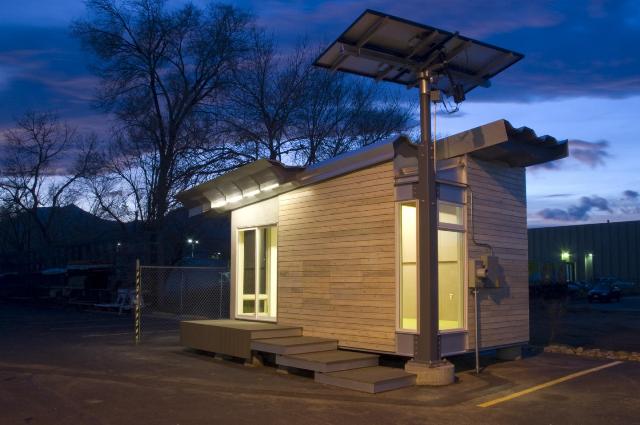Sep 16 2015
A University of Colorado Denver professor and former graduate student have been awarded a patent for a new, eco-friendly construction system that turns 100 percent recycled fibers into high strength, easy-to-assemble building materials. The patent is the first for CU Denver's College of Architecture and Planning.
 CU Denver architecture professor Julee Herdt built this structure out of her BioSIP system, super strong boards made of 100 percent recycled material. CREDIT University of Colorado Denver
CU Denver architecture professor Julee Herdt built this structure out of her BioSIP system, super strong boards made of 100 percent recycled material. CREDIT University of Colorado Denver
Professor of Architecture Julee Herdt along with former graduate student Kellen Schauermann were awarded the patent for a construction system known as BioSIPS (Bio-Structural Insulated Panels) used to build walls, roofs and floors.
The system turns waste materials like paper, noxious weeds, industrial hemp and discarded forest products into high quality building products used in a variety of construction projects. BioSIPs boards are strong, lightweight and easy to assemble.
The name "BioSIPs" combines the word "Bio" meaning living and "SIPs," an industry acronym for "Structural Insulated Panels." As a newly invented sustainable material, BioSIPs can help replace petroleum-based building products known to harm humans and the environment. The invention is based on Herdt's research and teaching program at CU Denver and with the U.S. Department of Agriculture, Forest Products Laboratory.
"The BioSIPs invention actually consumes society's waste and diverts tons of trash into valuable products for safe, strong, and energy efficient buildings," Herdt said. "There is great beauty and value in waste materials. It just takes the right processes and methods to find it, and with BioSIPs we've invented and now patented these techniques."
As an architect and researcher, Herdt always tests her bio-based inventions in her own residences and projects. She's currently designing her "very small home" in Boulder, Colorado, using BioSIPs and other prototype ideas that she has in the works.
In 2007, Herdt invited CU Denver graduate student Schauermann to work with her in advancing BioSIPs technology. The two founded BioSIPs, Inc. as a CU spin-off company in 2008 while continuing research and development of bio based materials and products. They brought in other CU Denver architecture students for construction of a BioSIPs building made entirely from the SIP panels that showcase a range of bio-based furniture, sliding wall and ceiling panels and signage.
Herdt and Schauermann have an additional patent pending in collaboration with John Hunt of the USDA Forest Products Lab for software applications allowing creation of multi-shaped versions of BioSIPs panels and fiberboards that can curve, bend and take many shapes not possible with other Sips. The patent also includes methods for enhancing all grades of waste fibers in their bio-based boards while simultaneously generating information about strengths and economics for manufacturing their products.
Herdt continues to work with the University of Colorado Technology Transfer Office on bio-based building product intellectual property while moving BioSIPs to commercialization.
Source: http://www.ucdenver.edu/